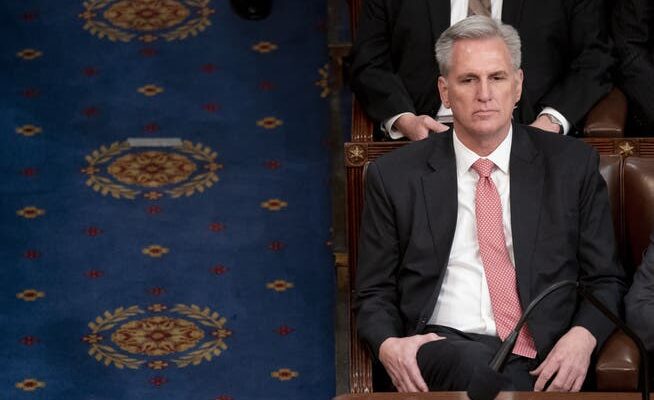The delayed election of a speaker in Congress is not yet a drama. But maybe it’s just the prelude to more chaos from summer. When it comes to raising the debt ceiling and fresh money for Ukraine, a deadlock could have more serious consequences.
With new concessions, Kevin McCarthy tried to win at least some of the rebels over to his side – in vain.
For three days, the wafer-thin Republican majority in the House of Representatives has been trying in vain to elect a speaker. As long as this does not happen, the United States’ grand chamber of parliament will remain incapable of action. The newly elected deputies cannot be sworn in, the commissions cannot be filled and no new laws can be passed. Parliamentarians are also not allowed to receive secret service briefings, and at some point it could also become difficult to pay wages.
There hasn’t been a mess like this in 100 years. Democrats in particular warn of the danger that Congress might not be able to react in the event of a crisis situation. However, the probability of such a scenario is low. Should it nevertheless happen, it would primarily be up to the President and his government. The current blockade could go on for days or even weeks without major effects, even former Republican MP and Trump critic Adam Kinzinger told CNN on Thursday. However, it is dangerous in the long run.
With the concessions, the demands also increase
For the time being it is an ugly but democratically fought power struggle within the Republican Party. The right wing of the Conservatives is mercilessly exploiting the narrow majority in the House of Representatives to extort as many concessions as possible from the party leadership. Kevin McCarthy, the favorite for Speaker, needs 218 votes. However, his party only has 222 seats in the grand chamber. Five dissenters on the right edge are therefore sufficient to prevent his election. However, a total of 21 Republicans did not vote for McCarthy in the seventh and eighth ballots on Thursday.
With new concessions on Thursday night, McCarthy tried to win at least some of the rebels over to his side. McCarthy had already come a long way to accommodate them. He had agreed that only five members of parliament can request a vote of no confidence against him at any time. Now he is apparently ready to reduce this hurdle to a single parliamentarian. In addition, the right-wing conservative wing is to receive at least two seats on the Rules Committee, which exerts great influence on legislation and the possibilities for debates on it. In addition, the twelve spending laws per year are to be passed in separate votes and not as huge packages. A term limit for MPs is also under discussion. At the same time, an action committee affiliated with McCarthy pledged to stop investing money in more moderate candidates in primaries for vacant seats in Republican strongholds.
For the time being, however, this was not enough for McCarthy to win over a large number of rebellious party colleagues. The resistance fighters are not a homogeneous group. Some seem to be primarily concerned with limiting the power of the party leadership and the more moderate MPs in order to increase their own influence. Another part, however, seems driven by a deep personal contempt for McCarthy.
The 57-year-old Californian originally positioned himself as the leader of a new conservative generation. But instead of developing his own political vision, he has been currying favor with the Trump wing in recent years. Trump himself liked to call McCarthy “my Kevin”. The die-hard Trumpists on the right-wing edge of the Republican Party, however, do not buy McCarthy’s change. They still see him as a slick representative of the establishment who will betray them at the earliest opportunity should the political tide turn.
Speaker – America’s craziest job
The right-wing conservative resistance would therefore extort as many concessions as they could from McCarthy and then choose someone else as speaker, Kinzinger predicted on Thursday morning. Should the favorite throw in the towel, Steve Scalise would likely be there to step in. The congressman from the southern state of Louisiana is the current number two Republican in the House of Representatives. However, he is unlikely to be able to take back the concessions McCarthy has already made to the rebels. At the same time, he must also be careful not to provoke an uprising among the moderate Republicans by favoring the right wing. The conservative “Wall Street Journal” therefore headlined in a comment on Wednesday: “Who is crazy enough to become a Republican speaker?” And the subtitle was: “You can’t lead a majority that would rather be in the minority.”
Regardless of who ends up taking the post of speaker, that person will be held hostage by the right-wing Republican party. Unless there is a miracle in which the moderate Republicans and the Democrats agree on a compromise candidate. It would be a historic upheaval. If he does not come, there could be a far greater paralysis of Congress in the summer and fall. Then the House of Representatives will probably have to raise the debt ceiling and approve new aid for Ukraine. The Republican rebels are critical of both things. They will then also sell their votes very dearly in order to force concessions in their interests.
If the blockade persists, the worst-case scenario could be that the United States could default on payments and the supply of weapons to the Ukrainian armed forces could dry up. In the end, the moderate forces in both major parties should probably not let things come to an end. But finding a compromise with this House of Representatives seems more difficult than ever before.
